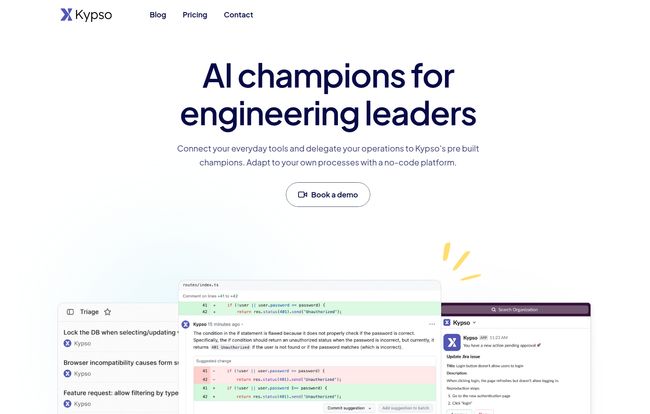How much of an engineering manager’s day is spent… not engineering? Or managing? But just… syncing. Nudging people on Slack for a PR review, updating a Jira ticket that everyone forgot about, preparing for a sprint planning meeting that could have been an email. It’s the digital equivalent of shuffling papers. A soul-sucking grind that pulls your best people out of that precious state of flow.
We’ve all been there. We’ve tried every new project management tool, every new communication philosophy. And yet, the operational sludge remains. So when I first heard about Kypso and its promise of “AI champions for engineering leaders,” my inner cynic perked up. Oh, great. Another platform. Another dashboard. More notifications.
But then I looked closer. Kypso isn’t trying to be another Jira or Slack. Instead, it wants to work with them. It offers to delegate all that annoying sync work to a team of specialized AI agents. It’s a fascinating pitch. So, is Kypso the real deal, or just more AI hype? I decided to find out.
So, What on Earth Is Kypso?
Think of Kypso less as a single tool and more as a new member of your team. Or rather, a whole crew of them. At its core, Kypso is a platform that lets you deploy “AI Champions”—specialized bots designed to handle specific, repetitive operational tasks that plague every engineering team.
It connects to the tools you’re already using (your GitHub, your Slack, your Jira) and acts as an intelligent layer on top of them. The goal isn't to replace your workflow, but to automate the most tedious parts of it. It’s like hiring a team of hyper-efficient, eternally patient assistants who never get tired of chasing down status updates. And the best part? You can customize them or even build your own using a no-code interface. That's a huge plus in my book; you don't need to pull a developer off a feature to build an internal tool.
Meet Your New AI-Powered Colleagues
The pre-built champions are where Kypso really starts to shine. These aren’t generic, one-size-fits-all bots. They're designed for very specific engineering roles. It’s a pretty clever approach.
Here are some of the key players on the roster:
- The Code Reviewer: Imagine a junior dev who does the first pass on every pull request. This champion identifies potential bugs, flags code smells, and points out deviations from best practices. This doesn’t replace a senior dev’s architectural eye, but it cleans up the noise, letting human reviewers focus on what matters. It's like a linter with a PhD.
- The Scrum Master: This one is for anyone who dreads ceremony prep. It automates scheduling, sends reminders, and even helps with backlog management and grooming. Anything that reduces time spent in meetings is a win in my book.
- The Support Hero: This champion keeps an eye on support channels like Slack, making sure no user query falls through the cracks. It can surface unresolved discussions and summarize important threads, turning chaotic feeds into actionable intel.
- The Incident Leader: When things go sideways, this champion helps run the response. It automates alerting, tracks action items, and assists with post-mortems. It brings a bit of calm to the chaos.
They also have a Release Manager for deployment checklists and a Tech Debt Manager on the way. Seeing a roadmap with relevant, needed features is always a good sign. It shows they understand the actual pain points.

Visit Kypso
The Real Power: Custom Champions Without Code
Pre-built solutions are great, but let’s face it, every engineering team is a unique, and sometimes weird, little ecosystem. I’ve worked on teams where the definition of “done” was a 10-step process involving three different platforms and a carrier pigeon. An off-the-shelf tool would just laugh and walk away.
This is where Kypso’s no-code builder gets interesting. It claims you can adapt their champions or create entirely new ones from scratch to fit your team’s specific rituals. Want an AI that cross-references Jira tickets with customer feedback from Intercom and posts a summary in a specific Slack channel every Friday? Theoretically, you can build that. This adaptability is critical. So many tools fail because they impose a rigid structure. The idea of a tool that bends to your process, not the other way around, is genuinely appealing.
The Good, The Bad, and The Actually Useful
No tool is a silver bullet. After digging in, here’s my honest take on Kypso’s strengths and where it might stumble.
What I Really Like
The biggest win is the potential for reclaiming focus. The cost of context switching for developers is massive. A study from the University of California, Irvine, years ago found it can take over 23 minutes to get back on track after an interruption. If Kypso can absorb even a handful of those interruptions per day—a Slack nudge here, a status query there—the productivity gains could be enormous. It’s also about automating the thankless tasks, the “sync work” that burns people out and adds little direct value. It frees up smart people to solve hard problems.
Some Potential Hurdles
On the flip side, Kypso is entirely dependent on its integrations. It's a layer, not a foundation. If your existing tools and processes are a complete mess, Kypso won't magically fix them. It might help you see the chaos more clearly, but it’s a case of garbage-in, garbage-out. There’s also likely a learning curve. Yes, it’s “no-code,” but that term can be misleading. I’d bet setting up a truly custom, effective champion still requires a bit of trial and error and a clear understanding of the process you want to automate. It's not a magic wand.
Let's Talk Money: Kypso's Pricing Breakdown
Ah, the all-important question. Is it affordable? Kypso has a pretty straightforward pricing model that seems designed to let you try before you commit.
| Plan | Price | Key Features |
|---|---|---|
| Free | $0 / month | 1 seat, 1 champion, 50 champion runs per month. |
| Team | $20 / contributor / month | Up to 20 seats, unlimited champions, 1,000 champion runs per month. |
| Enterprise | Custom | SSO, 24/7 support, dedicated CSM, and other big-company needs. |
The Free plan is basically a no-risk trial. It’s limited, for sure, but 50 runs is enough to automate one specific, annoying task to see if you like the platform's feel. I appreciate that.
The Team plan at $20 per contributor per month is where most will land. Now, is that expensive? I guess it depends on what you compare it to. If it saves an engineer—whose fully-loaded cost is easily hundreds of dollars per day—even one or two hours of wasted time a month, it pays for itself several times over. You have to do that math for your own team. The term 'contributor' is also interesting, suggesting it might not be a per-seat license for every single person in the org, which could be cost-effective.
My Final Verdict: Is Kypso Worth a Shot?
After looking at Kypso, I’ve moved from cynical to cautiously optimistic. This isn't just another layer of management cruft. It's an attempt to solve a real, nagging problem in a novel way. The philosophy behind it—respecting developer time and deep work—is something I can absolutely get behind.
It won't be for everyone. If your team is tiny and your processes are super fluid, it might be overkill. But for any established engineering team that feels the constant, grinding pain of operational overhead, Kypso is one of the most interesting solutions I’ve seen in a long time. Its not perfect, but it’s a bold step in the right direction. If you're tired of watching your team's energy get drained by busywork, giving the free plan a spin seems like a no-brainer.
Frequently Asked Questions about Kypso
1. What tools does Kypso integrate with?
Based on their site, Kypso integrates with essential engineering tools like GitHub, Slack, and Jira. The effectiveness of the champions depends on these connections to pull data and perform actions within your existing workflow.
2. Can I really build an AI champion with zero coding skills?
Yes, that’s the main promise of their no-code platform. While you don't need to write code, you will need a solid understanding of your team's processes and a logical mind to set up the triggers, actions, and rules for your custom champion. Expect a small learning curve, but not a programming one.
3. Is Kypso secure for my team's data?
Kypso highlights security and privacy on their website, stating they don't store any source code. For any tool that integrates this deeply into your workflow, you should always review their security and privacy policies carefully to ensure they meet your company's standards.
4. How is Kypso different from a standard project management tool?
Kypso isn't designed to replace tools like Jira or Asana. Instead, it acts as an automation and intelligence layer on top of them. While a PM tool is a database for tasks, Kypso is an engine that performs actions based on the data in those tools, like reminding people, flagging risks, or summarizing progress.
5. What are the main limitations of the Kypso Free plan?
The Free plan is quite restrictive. You get only one user seat, one champion, and a cap of 50 automated "runs" per month. It's best viewed as an extended trial to test a single, specific use case before committing to a paid plan.
6. Who is the ideal user for Kypso?
The ideal user is likely an engineering manager, team lead, or VP of Engineering at a small to mid-sized company who is actively trying to improve team efficiency and reduce manual overhead. They are feeling the pain of process friction and want a way to automate it without a major internal development project.
Reference and Sources
Kypso Official Website: https://www.kypso.io/
Research on Interruption Cost: Mark, G., Gudith, D., & Klocke, U. (2008). The cost of interrupted work: more speed and stress. In Proceedings of the SIGCHI conference on human factors in computing systems.



